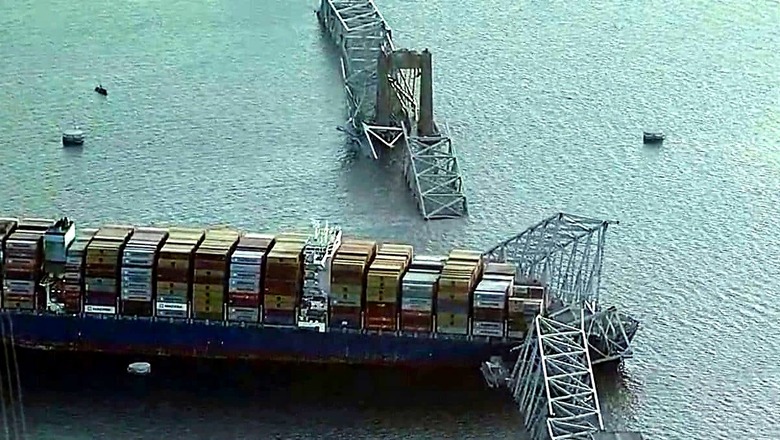
views
Days after the dramatic collision between the cargo ship Dali and the Francis Scott Key Bridge in the US city of Baltimore, 22 Indian crew members found themselves in an unexpected limbo. The ship, carrying 4,700 containers lost power, resulting in the tragic collapse of the bridge and the loss of six lives from a construction crew.
Much of the span crashed into the Patapsco River, blocking the Port of Baltimore’s shipping channel. Salvage crews worked to lift the first piece of the collapsed bridge from the water on Saturday to allow barges and tugboats to access the disaster site. As local authorities undertake the initial phase of a complex endeavor to reopen the city’s blocked port, the crew members have remained aboard the ship, tasked with maintaining its operability while responding to inquiries from officials investigating the catastrophe.
India on Thursday said it is in close touch with Indians onboard and the local authorities following the collapse in Maryland. Addressing a weekly press briefing, Externa Affairs Ministry spokesperson Randhir Jaiswal said all the Indian crew members of the ship were safe. Jaiswal said, “Out of the 21 crew members, 20 are Indians. All of them are in good shape, and in good health. One of them was slightly injured, and needed to have some stitches. The stitches have been given, then gone back to the ship. Our Embassies are in close touch with the Indians on board and also local authorities in this matter.”
Despite limited access to the outside world, they swiftly transmitted a mayday call before the collision, aiding in traffic control and potentially saving lives. While the cause of the accident is under probe, questions arise about the emotional toll on the crew members. Joshua Messick, of the Baltimore International Seafarers’ Center, told The New York Times about the weight of responsibility they may feel for the tragedy.
Although they continue their duties on the ship, the crew members face uncertainty about their future. With the vessel immobile amidst debris, their return home is delayed until the ship is freed and the channel reopened. Chris James, assisting the ship’s management company, said that the crew’s needs are met, including food, water, and fuel. However, there’s no definite timeline for extraction from the wreckage.
The Indian crew’s prolonged stay garners attention due to the country’s significant presence in the maritime industry. While they maintain the ship’s operations, concerns arise about the potential impact on their livelihoods and the nation’s international image. Clistan Joy Sequeira, an Indian seafarer who was not on the ship but who docked in Baltimore from another cargo ship, told the NYT that he feared the possible repercussions of the incident on his industry and his country. “I’m scared that because this crew is Indian, our international image will suffer,” said Sequeira. “Maybe we lose jobs.”




















Comments
0 comment